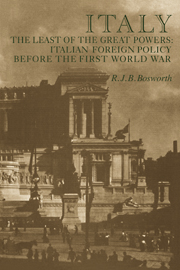Book contents
- Frontmatter
- Contents
- Dedication
- Preface
- List of maps
- 1 Society and politics in Liberal Italy
- 2 New political pressure groups and foreign policy
- 3 The making of a Foreign Minister: Antonino Di San Giuliano
- 4 The Consulta: the bureaucrats of foreign policy
- 5 How Italy went to Libya
- 6 How Italy stayed in Libya
- 7 The politics of alliance: Italy in the Triple Alliance, 1912–1914
- 8 The politics of friendship: Italy, the Triple Entente, and the search for a new Mediterranean agreement, 1911–1914
- 9 ‘Un cliente maleducato’: Italy in the Dodecanese and Ethiopia, 1912–1914
- 10 Preparing to digest some spoils: Italian policy towards Turkey, 1912–1914
- 11 San Giuliano's epilogue. The realities of European war 28 June to 16 October 1914
- Conclusion
- Appendix I The Ten Commandments for Italians abroad
- Appendix II Pro-memoria on our politico-military situation, by A. Pollio
- Appendix III San Giuliano's poem about his funeral ceremony
- Abbreviations used in the notes and bibliography
- Select bibliography
- Notes
- Index
8 - The politics of friendship: Italy, the Triple Entente, and the search for a new Mediterranean agreement, 1911–1914
Published online by Cambridge University Press: 16 November 2009
- Frontmatter
- Contents
- Dedication
- Preface
- List of maps
- 1 Society and politics in Liberal Italy
- 2 New political pressure groups and foreign policy
- 3 The making of a Foreign Minister: Antonino Di San Giuliano
- 4 The Consulta: the bureaucrats of foreign policy
- 5 How Italy went to Libya
- 6 How Italy stayed in Libya
- 7 The politics of alliance: Italy in the Triple Alliance, 1912–1914
- 8 The politics of friendship: Italy, the Triple Entente, and the search for a new Mediterranean agreement, 1911–1914
- 9 ‘Un cliente maleducato’: Italy in the Dodecanese and Ethiopia, 1912–1914
- 10 Preparing to digest some spoils: Italian policy towards Turkey, 1912–1914
- 11 San Giuliano's epilogue. The realities of European war 28 June to 16 October 1914
- Conclusion
- Appendix I The Ten Commandments for Italians abroad
- Appendix II Pro-memoria on our politico-military situation, by A. Pollio
- Appendix III San Giuliano's poem about his funeral ceremony
- Abbreviations used in the notes and bibliography
- Select bibliography
- Notes
- Index
Summary
On 2 August 1914 King Victor Emmanuel III initialled military plans for action by Italy on her north-western borders, that is against France. That very day the Italian government was preparing its declaration of neutrality, which was issued the next morning. After this decision had been made public, San Giuliano talked frankly with Olindo Malagodi, direttore of La Tribuna. Italy had not joined her Triple Alliance partners in war, he explained, because British naval strength had to be recognised as the force majeure: ‘our decision depended necessarily on that of England’.
No doubt the contrasting royal initials were more a product of the automatic machinery of bureaucracy than the serious making of foreign policy around a strategic plan. Yet, the apposition of potential military conflict with France, and wholly necessary naval peace with Britain, is most striking. At the great crisis point, with war imminent, with the most crucial foreign policy decision in her history demanded, Liberal Italy acted as though a contest with Britain was out of the question, but a fight with France was possible, and perhaps not unattractive.
Many Italian statesmen of the post-Risorgimento regime would not have been surprised at that apposition. If sometimes obscured by the greater threat from Austria, the strand of hostility to France had been a constant one in Italian diplomacy since unification. The questions of Trento and Trieste always carried the extra danger of exacerbating domestic irredentism, and thus Mazzinian republicanism hostile to the Savoyard regime. But any Italian government looking to the Mediterranean immediately ran into the rivalry of France, that ‘Latin sister’ often dubbed the sorellastra, the nasty step-sister, by sensitive Italians.
- Type
- Chapter
- Information
- Italy the Least of the Great PowersItalian Foreign Policy Before the First World War, pp. 255 - 298Publisher: Cambridge University PressPrint publication year: 1979

